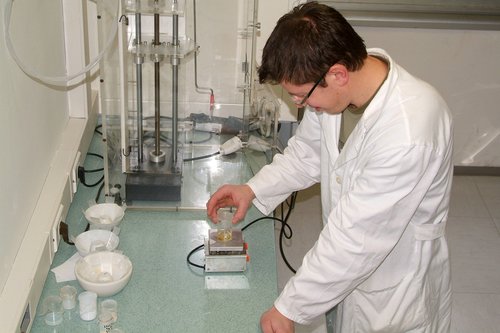Bachelor's programme Environment (first cycle)
| Study programme: | Bachelor's programme in Environment (first cycle) |
|---|---|
| Main fields of study: | Environmental pollution, protection, policy and management |
| Programme code: | 1OK |
| Programme cycle: | First cycle academic degree |
| Name of the qualification: | Diploma |
| Qualification title: | Diplomant okoljskih ved (equivalent to Bachelor of Science) |
| Qualification abbreviation: | dipl. okolj. ved |
| Final examination: | no |
| Dean: | prof. dr. Griša Močnik |
| Programme director: | doc. dr. Blaž Belec |
Programme description
Study programme Environment is an interdisciplinary Bachelor's program that offers university degree education. The program was prepared according to Bologna guidelines by reorganizing the four year university degree programme offered by the School of Environmental Sciences since 2000. The study programme lasts for six semesters and it covers all important subjects of natural, technical and social sciences that are related to the problems in the environment, like for example soil, water and air pollution, measurements in the environment, ecotoxicology, environmental health, waste management, nature protection, environmental policy, environmental impact assessment, environmental economics, environmental law and communication. Successfully completed study program grants the title "Diplomirani okoljski tehnolog" (equivalent to Bachelor in environmental technology).
Admission requirements
To register as a student at the first cycle of the study programme Environment the students have completed general matura or before June 1, 1995 completed any four-year secondary school program or completed the final examination following a suitable vocational secondary school (poklicna matura) in the field of: nature conservation technician, environmental conservation technician, electrical technician, pharmaceutical technician, geodetic technician, geotechnician, forestry technician, horticultural technician, chemical technician, agro-entrepreneurial technician, laboratory biomedical technician, computer technician, veterinary technician, nursing technician, food nutritionist optician or mechatronics technician and an examination in one of the subjects of the general matura: biology, chemistry or physics. This such subject shall not be the same as any of the subjects that the candidate has already successfully completed in the final examination of the vocational secondary school. The number of available positions at the Bachelor's programme Environment is limited to 40.
Educational and professional goals
The objective of the study programme Environment is to educate experts who will be capable of working in research, technical and administrative fields, and who will be able to realize legislative and executive tasks at the local, national and international level. One of the characteristics of the study programme is a uniform syllabus for all first year students. This offers a good and broad background in the natural and mathematical sciences and the knowledge needed to understand relationships between individual segments and processes in the environment.
Access to further studies
After finishing the first cycle graduates can continue their study at the masters programme Environment (second cycle) at the University of Nova Gorica and at other universities, for which they fulfill the admission requirements.
Assessment
The knowledge test is planned in advance. For each subject, there are at least three exam dates in the current academic year. Appointments are set within two weeks of the start of the academic year. The method of assessing the student's knowledge depends on the content and method of implementation of the individual course. Products such as term papers and projects may be assessed, with an emphasis on the student's oral presentation in front of the teacher and students in addition to the written product. This encourages the most active approach, creativity, and the development of presentation and argumentative discussion skills. The acquired knowledge is checked with written and/or oral exams, but also with colloquiums as an ongoing form of knowledge verification.
Other
Courses refresh
1. year
| Mandatory subjects | Hours | ECTS |
|---|---|---|
| Biology | 300 | 10 |
| Chemistry | 300 | 10 |
| Environment and Society | 120 | 4 |
| Environment information systems and GIS | 90 | 3 |
| Introduction to Group Project Work | 90 | 3 |
| Mathematics | 300 | 10 |
| Physics | 300 | 10 |
| Statistics | 150 | 5 |
| The fundamentals of Environmental Science | 150 | 5 |
2. year
3. year
| Compulsory courses | Hours | ECTS |
|---|---|---|
| Diploma Seminar | 90 | 3 |
| Environmental Economics | 150 | 5 |
| Environmental Management | 150 | 5 |
| Environmental Monitoring | 210 | 6 |
| Measurement and improvement of air quality | 90 | 3 |
| Modelling | 120 | 4 |
| Nature Protection | 180 | 6 |
| Practical Placement | 360 | 12 |
| Selected V | 90 | 3 |
| Selected VI | 90 | 3 |
| Selected VII | 90 | 3 |
| Waste Treatment and Management | 120 | 4 |
| Water and Wastewater Technology | 90 | 3 |
| Elective subjects | Hours | ECTS |
| Basic Karstology | 90 | 3 |
| Conservation Biology and Biogeography | 90 | 3 |
| Ecology | 150 | 5 |
| Ecotoxicology | 90 | 3 |
| Environment and Agriculture | 90 | 3 |
| Environmental Impact Assessment | 90 | 3 |
| Environmental bioinformatics | 90 | 3 |
| Health Ecology | 90 | 3 |
| Limnology | 90 | 3 |
| Programming for process control | 90 | 3 |
| Radioactivity and Radiation Protection | 90 | 3 |
| Technologies of Biomass Exploitation | 90 | 3 |
| Toxicology and Cancerogenesis | 90 | 3 |


